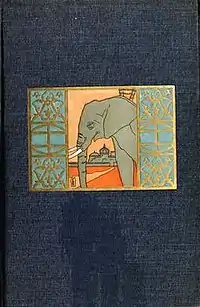Following the Equator
Following the Equator (sometimes titled More Tramps Abroad) is a non-fiction social commentary in the form of a travelogue published by Mark Twain in 1897.
 Following the Equator cover | |
| Author | Mark Twain |
|---|---|
| Country | United States |
| Language | English |
| Genre | Travel literature |
| Publisher | American Publishing Company |
Publication date | 1897[1] |
| Media type | |
| Pages | 718 |
| Preceded by | Personal Recollections of Joan of Arc |
| Followed by | A Dog's Tale |
Twain was practically bankrupt in 1894 due to investing heavily into the failed Paige Compositor. In an attempt to extricate himself from debt of $100,000 (equivalent of about $2,975,000 in 2020) he undertook a tour of the British Empire in 1895 at age 60, a route chosen to provide numerous opportunities for lectures in English.
The first edition of this book was illustrated by Dan Beard, A.B. Frost, B.W. Clinedinst, Frederick Dielman, Peter Newell, F.M senior, C.H. Warren, A.G. Reinhart, F. Berkeley Smith, and C. Alllan Gilbert, many of whom had previously worked with Twain. In England the book was published under the title More Tramps Abroad.
American songwriter Jimmy Buffett mentions the book in his songs “Take Another Road” and “That’s What Living Is To Me”.
Themes
Throughout the novel, Twain uses the opportunity of visiting the various locations on his tour to espouse "perceptive descriptions and discussions of people, climate, flora and fauna, indigenous cultures, religion, customs, politics, food, and many other topics". The novel contains a significant amount of social commentary, although much of it is done in a satirical manner.
Although this social commentary is the great import of the book, it is notable that Twain also included a number of fictional stories in the body of what is otherwise a non-fiction work. In particular, the story of how Cecil Rhodes made his fortune -- by finding a newspaper in the belly of a shark -- and the story of how a man named Ed Jackson made good in life out of a fake letter of introduction to Cornelius Vanderbilt, were anthologized in Charles Neider (ed) The Complete Short Stories of Mark Twain, (Doubleday, 1957) where they are presented as fiction.
Notes
- Facsimile of the original 1st edition.
References
- Twain, Mark (1897). Following the Equator - A journey around the world. Hartford and New York: American Publishing Co. and Doubleday & McLure Co. – via Internet Archive.
External links
| Wikiquote has quotations related to: Following the Equator |
- Twain's Notes, Mock-up of Title Page, Dedication of Following the Equator Shapell Manuscript Foundation
- Olivia Langdon Clemens to Publisher Walter Bliss on Success of Following the Equator
- Following the Equator at Project Gutenberg
 Following the Equator public domain audiobook at LibriVox
Following the Equator public domain audiobook at LibriVox